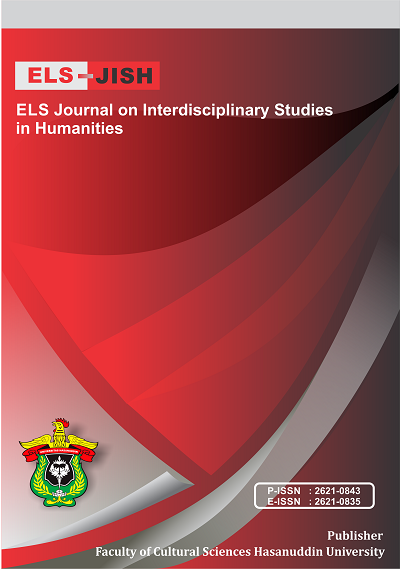"My Body is not Mine": Woman's Oppression Portrayed in Layla AlAmmar’s The Pact We Made
DOI:
https://doi.org/10.34050/elsjish.v6i1.24810Keywords:
Kuwaiti woman, Oppression, Patriarchal culture, The Pact We Made, Woman oppressionAbstract
This study analyzes the oppression and differences between modern life and family life in traditional conservative Kuwaiti society experienced by Dahlia, the main female character in The Pact We Made. This study aims to examine how oppression Dahlia experienced as a Kuwaiti woman and what are the differences between her modern life and her family's conservative traditional life. The researchers used a qualitative descriptive method to conduct this research. Primary data used in this study is a novel entitled The Pact We Made by Layla Alammar, while secondary data is another source related to research objectives. The researcher applies the theory of standpoint feminism by Sandra Harding and Nancy Hartsock and the concept of oppression by Iris Marion Young to show what form of oppression through the lens of standpoint feminism are experienced by the main character in this book. The results of the research show that the oppression experienced by Dahlia is a type of powerlessness and cultural imperialism. This is shown by Dahlia who is not allowed to make her own choices and feels unable to go against the traditional rules of her parents and Kuwait society which is still strong with a patriarchal culture that underestimates women.Downloads
References
Andini, C., Sosrohadi, S., Fairuz, F., Dalyan, M., Rahman, F. F., & Hasnia, H. (2022). The Study of Japanese Women in the Facial Treatment Advertisement: A Semiotics Perspective of Pierce’s Theory. ELS Journal on Interdisciplinary Studies in Humanities, 5(2), 337-347.
Andini, C. (2017). Children Emotion in The Movie" Big Hero 6" (Doctoral dissertation, Universitas Islam Negeri Alauddin Makassar).
Alammar, L. (2019). The Pact We Made. London:HarperCollins Publishers.
Buscemi, E. (2022). The Pact(s): Identity, Gender, and Social Order in Kuwaiti Literature. In S. Hopkyns & W. Zoghbor (Eds.), Linguistic Identities in the Arab Gulf State: Waves of Change, 89-104. Routledge. DOI: https://doi.org/10.4324/9781003149637
Gurung, L. (2020). Feminist standpoint theory: Conceptualization and utility. Dhaulagiri Journal of Sociology and Anthropology, 14, 106-115.
Halizza, B. C. N. (2022). Changing The Largest Force of Inequality by Ruqayya in Radwa Ashour’s The Woman from Tantoura. Prosodi, 16(2), 98–108. https://doi.org/10.21107/prosodi.v16i2.13116
Heldke, L. M., & O'Connor, P. (2004). Oppression, privilege, and resistance: Theoretical perspectives on racism, sexism, and heterosexism. McGraw-Hill Humanities, Social Sciences & World Languages.
Idris, A. A., et al. (2018). Depiction of Women as the Primary Architects of their own Oppression: A Masculinist Critique of El Saadawi’s Woman at Point Zero. International Journal of Applied Linguistics & English Literature, 7(4), 206-212. DOI: https://doi.org/10.7575/aiac.ijalel.v.7n.4p.206
Jose, S. E. (2021). The Trauma of Being a Woman: Oppression of Women in Arundhati Roy’s The God of Small Things. The Creative Launcher, 6(1), 159–166. https://doi.org/10.53032/tcl.2021.6.1.18
Prajnandhari, D. (2021). Woman Oppression In The Handmaid’s Tale Tv Series Season 1: Transitivity Analysis. Journal of English Language and Culture, 11(1). https://doi.org/10.30813/jelc.v11i1.2402
Rahman, F. (2018). The Constraints of Foreign Learners in Reading English Literary Works: A Case Study at Hasanuddin University. Journal of Arts and Humanities, 7(2), 01-12.
Saragih, G. A., & Simanjuntak, M. B. (2022). Analysis of the Social Value of Friendship in the Novel “5 cm” by Donny Dhirgantoro. PUSTAKA: Jurnal Bahasa dan Pendidikan, 2(1), 12-20. https://doi.org/10.56910/pustaka.v2i1.225
Shlasko, D. (2015). Using the Five Faces of Oppression to Teach About Interlocking Systems of Oppression. Equity &Amp; Excellence in Education, 48(3), 349–360. https://doi.org/10.1080/10665684.2015.1057061
Simanjuntak, D. N., Tambunan, A. R. S., & Tetty, M. (2021). Main Character’s Struggle Againsts Woman Oppression In “Marlina The Murderer In Four Acts” Movie. Linguistica, 10(1), 418. https://doi.org/10.24114/jalu.v10i1.24253
Steiner, L. (2014). Sandra Harding: the less false accounts of feminist standpoint epistemology. In Philosophical profiles in the theory of communication (pp. 261–289). Peter Lang.
Wehbi, L. (2021). Construction of the Character of Young Labiba in the Novel Ein Khafsha by Rajaa Bakriyyeh. In E. B. Eshel et al. (Eds), Jewish and Arab Childhood in Israel: Contemporary Perspectives (pp. 247-260). Lexington Books.
Young, I. M., & Allen, D. S. (2022). Justice and the Politics of Difference (Princeton Classics, 122). Princeton University Press.
Youssef, S. M. (2017). The Exploitation of Women and Social Change in the Writing of Nawal El-Saadawi. Journal of International Women’s Studies, 18(4), 233-246.
Downloads
Published
How to Cite
Issue
Section
License
Copyright (c) 2023 Hasnul Insani Djohar, Ghea Regita Budiantari, Nihayatun Ni’mah, Muhamad Rizky Farezi

This work is licensed under a Creative Commons Attribution-ShareAlike 4.0 International License.

















